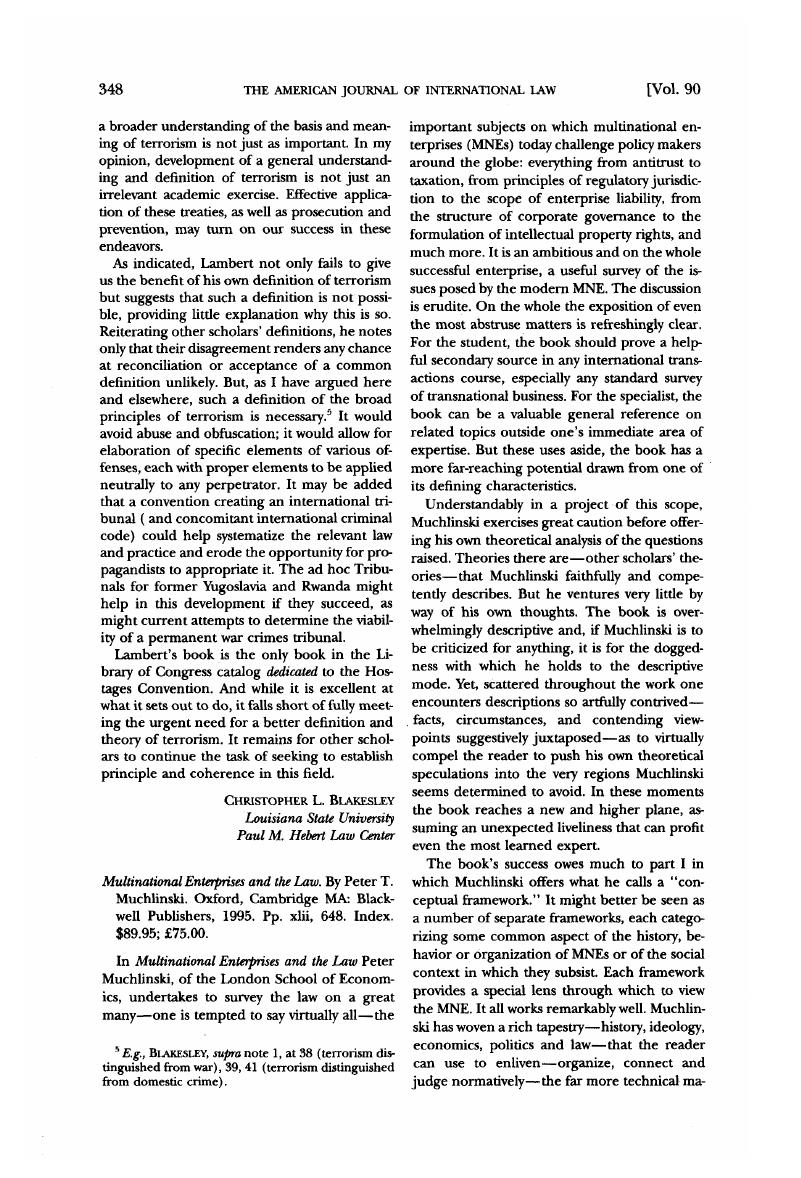No CrossRef data available.
Article contents
Multinational Enterprises and the Law. By Peter T. Muchlinski. Oxford, Cambridge MA: Blackwell Publishers, 1995. Pp. xlii, 648. Index. $89.95; £75.00.
Published online by Cambridge University Press: 27 February 2017
Abstract

- Type
- Book Reviews and Notes
- Information
- Copyright
- Copyright © American Society of International Law 1996
References
1 In particular, these theorists emphasized the dynamic interactions between industry reliance on die production of branded products incorporating advanced patented technology and die presence of significant economies of scale and of die management and die capital necessary to exploit die latter.
2 Paul A. Samuelson, Economics 680 (1973).
3 Here Muchlinski's discussion becomes somewhat obscure because he limits die doctrine of comparative advantage exclusively to differing natural endowments among states. Not since die Ohlin-Hecksher emendations on die basic static Ricardian model have static natural endowments been diought to establish the essential boundaries of die doctrine.
4 At the very end of his discussion, and in very cursory fashion, Muchlinski does take cognizance of what other analysts have proposed to cure any discontinuity that might exist between form and control. He identifies three alternative approaches as follows: The first would require that the corporate form correspond closely to the way the business is actually organized to ensure the existence of the relevant unit for fiscal, accounting and other managerial and regulatory purposes. The second approach would not touch the form, but would increase the obligations placed directly upon units or divisions within the MNE to meet certain reporting, accounting, fiscal and other regulatory standards. The third emphasizes the notion of “network liability” where the entire enterprise would be held accountable for the activities of the group and for assuring adequate reporting, accounting and fiscal control by the parts.
5 This perspective posits that the maximum possible latitude should be given to free, competitive markets because that is the best way to assure the efficient allocation of society's resources and attention to efficiency is the core imperative of national welfare.
6 While this perspective is not a priori opposed to foreign direct investment, its principal preoccupation is with imperfections of the market, imperfections that it finds are exacerbated by large-scale MNEs and that too often result in socially unacceptable distributional consequences, which, in turn, require continuous and significant corrective governmental intervention.
7 The Marxist strand emphasizes what is conceived to be the “‘imperialistic’” and exploitive character of “monopoly-capitalism,” which, in turn, yields a “centre-periphery” model of underdevelopment of which the MNE is the principal agent. This formulation then leads inevitably to advocating public ownership (nationalization) of what some have called the “commanding heights” of the national economy.
8 The nationalist perspective weaves together several, often highly emotive strands of popular thought, particularly prevalent, but not exclusively, in the developing countries. These comprise a desire to maintain national independence, self-determination, and cultural autonomy. To the extent the MNE is thought of as a serious threat to these desiderata, regulation or even total exclusion of the MNE is considered justified.
9 What seems to be missing here is any recognition by Muchlinski of the once-popular “import substitution” doctrine. Perhaps it is a form of “nationalism.” But it places far less emphasis on the virtues of national, political or cultural autonomy and is explicitly a theory of economic growth. It postulates that in the case of developing countries, infant domestic industries require a protective interlude in which they can develop the technology, the managerial and technical competence, the scale economies, and perhaps even the supporting infrastructure needed to compete with firms based in developed countries. Although primarily concerned with trade, the doctrine can have important adverse effects on inward investment flows.


